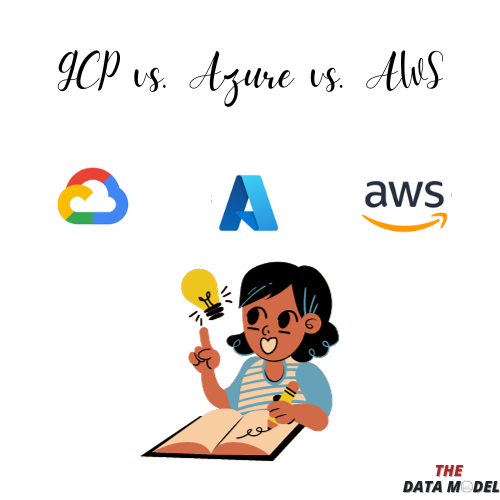Comparing the Cloud Giants: GCP, Azure, and AWS for Data-Driven Success
Google Cloud Platform (GCP), Microsoft Azure, and Amazon Web Services (AWS) are three of the most prominent cloud service providers, each offering a wide range of cloud computing services and tools for business, data analytics, and data science. In my opinion, these platforms generally enable you to accomplish the same goals, but while this may be true in some circumstances, they also exhibit notable differences which can make one platform more suitable for your specific use-case. Understanding their similarities and differences is crucial for making informed decisions about which platform to choose for your business needs.
Similarities:
1. Comprehensive Services: All three platforms offer a plethora of diverse services, including computing, storage, machine learning, and analytics. This means you can find everything you need within a single ecosystem. You can simply log into any of the platforms and find all the relevant resources that your team will need to design and deliver tools for the business.
2. Global Reach: They all have data centers located all over the world, ensuring low-latency access and redundancy, no matter where you operate. This means that they enable businesses to serve customers and store data close to their location to provide services with minimal delays or disruptions.
3. Scalability: GCP, Azure, and AWS allow you to scale resources up or down based on demand, helping to optimize costs and performance. This means that you can typically add or remove resources as needed based on your current circumstances.
4. Security and Compliance: Security is a priority for all three platforms. They provide robust security features and compliance certifications, giving businesses peace of mind for sensitive data.
Differences:
1. Pricing Models: Each platform has its own pricing structure, so it’s essential to understand these differences to control costs effectively. For example, AWS has a pay-as-you-go model, GCP has competitive pricing and Azure has the lowest on-demand costs. One question to ask yourself is whether your budget is a major concern for your IT needs. If so, you may need to pick the option that enables you to stay within budget and sufficiently accomplish your goals or you may need to make a compromise and pay extra for the platform that best suits your needs.
2. Ease of Use: User experience varies, and preferences might differ for various reasons. AWS offers robust services that can sometimes be complex, so it is often considered to be more developer-centric than the others. GCP is also developer-friendly, but to many people it is simpler than AWS. Azure is most popular for its user-friendly interface, and because it is a Microsoft platform, it can easily integrate with Windows environments and other Microsoft tools that people commonly use like Sharepoint, Power BI and Excel.
3. Machine Learning and Data Services: Of the three platforms, GCP stands out with its AI and machine learning capabilities because of its TensorFlow framework and strong AI research capabilities. Azure offers strong AI integration and AWS provides a wide range of data services.
My advice to beginners working on their first cloud computing data analytics project (not work sponsored) is that you may find it beneficial to complete the same project in all 3 platforms. This will give you first hand experience with their similarities and differences so you can see them in action and be prepared for your first official role where you may need to use cloud technologies.
Choosing the right cloud platform is a critical decision which ultimately depends on specific business needs. Understanding the similarities and differences can help businesses align their specific requirements with the strengths of GCP, Azure, or AWS. GCP is an excellent choice for organizations heavily invested in data analytics and machine learning. Azure is beneficial for businesses using Microsoft products and seeking a well-integrated ecosystem. AWS, with its extensive service catalog, suits a broad range of use cases. Each platform has its unique advantages, making them essential tools for modern businesses and data professionals.

